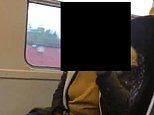Girl shouted at for briefly lifting face on train so her deafblind sister could lip read
Teenager is subjected to tirade of verbal abuse after she briefly lifts her face covering on a train – so her deaf blind sister could read her lips
- Karolina Pakenaite, 24, who has Usher syndrome, was travelling to Southport
- Pakenaite was accompanied by her 16-year-old sister Saule and her guide dog
- In a video of the incident, a passenger is heard questioning whether Karolina is really deafblind and why her sister had to move her mask to understand her
- The woman said ‘deafblind my a*se’ before another passenger intervened
By Pa and Chris Jewers For Mailonline
Published: 18:55 EDT, 24 July 2020 | Updated: 21:36 EDT, 24 July 2020
A teenager was subjected to a tirade of verbal abuse after she briefly lifted her face covering on a train so her deafblind sister could read her lips.
Karolina Pakenaite, who has Usher syndrome, was travelling to Southport with her 16-year-old sister Saule and guide dog when they were confronted by another passenger.
Despite explaining that 24-year-old Ms Pakenaite’s condition meant she was both hard of hearing and visually impaired, the woman refused to accept their explanation.
Their ordeal was recorded on a mobile phone as they travelled on a Merseyrail train from Liverpool Central on July 16.
The woman can be heard in the two minute-long clip questioning whether Ms Pakenaite was really ‘deafblind’ after she was able to respond to her comments.
‘You’re taking the pi**, you,’ the woman tells them.
Ms Pakenaite’s younger sister later responds: ‘Legally she is deafblind. There’s a spectrum. Google it.
‘You don’t know what you’re talking about.’
After the passenger questioned why she had moved her mask, Ms Pakenaite’s sister said in a distressed tone: ‘So she could lip read me. What do you want?’
The woman goes on to say ‘deafblind my a*se’, before another passenger intervenes.
The main symptoms of Usher syndrome are hearing loss and an eye disorder called retinitis pigmentosa, which causes night blindness and a loss of peripheral vision.
While all passengers are required to wear a face covering while on public transport, Government guidance says disabled people who cannot safely wear one are exempt.
Those who provide support to disabled people who may rely on lip reading, facial expressions and clear sound for communication, are also allowed to not wear one.
Charities have now called on the Government to do more to promote awareness around who is exempt from the face mask rules.
Richard Kramer, chief executive of the disability charity Sense, said his organisation had received ‘lots’ of reports of disabled people being challenged for not wearing a covering.


Karolina Pakenaite, who has Usher syndrome, was travelling to Southport with her 16-year-old sister Saule and guide dog when they were confronted by another passenger. Pictured above: Karolina films the woman as she unleashes a verbal tirade on the sisters
He said: ‘These experiences cause distress and anxiety, and lead many disabled people to feel they have to stay at home, where they become isolated.
‘We welcome the Government’s introduction of ‘exemption cards’, but more must be done to raise public awareness of who is exempt from wearing face coverings, so the public are on board and disabled people feel supported.’
It comes as new rules introduced on Friday made the wearing of face coverings in supermarkets and enclosed public spaces in England mandatory.
Speaking after the incident, Ms Pakenaite said: ‘I can no longer stay silent about this as I keep experiencing attacks and hearing similar experiences from others too. It’s taking an effect on my mental health.
‘Not enough people are taking this pandemic seriously but this behaviour is never acceptable.
‘Please, respect people individually, ask us, listen, discuss and I am always happy to hear ideas for alternative solutions, but harassment, name calling or any type of abuse or aggression will never be OK.’
Usher syndrome: What are the symptoms?
Usher syndrome is a condition characterised by partial or even total hearing loss, and vision that gets worse over time.
The hearing loss is caused by abnormalities in the inner ear, while the loss of vision is caused by an eye disease called retinitis pigmentosa (RP).
RP affects the layer of light-sensitive tissue at the back of the eye, and the loss of vision occurs as the light-sensing cells of the retina deteriorate over time.
Loss of night vision begins first, followed by blind spots that reduce peripheral vision. Over time, these blind spots merge to create tunnel vision.
Many people with RP maintain some central vision for their lives, but in some cases vision is impaired by clouding of the lens of the eye.
There are three different types of Usher syndrome.
Most people with Usher syndrome type one are born with severe hearing loss, with the loss of vision progressing throughout childhood.
The second type of the syndrome is characterised by hearing loss from birth and progressive vision loss that begins in adolescence or adulthood, while the third type sees hearing loss and vision loss beginning later in life.
![]()


